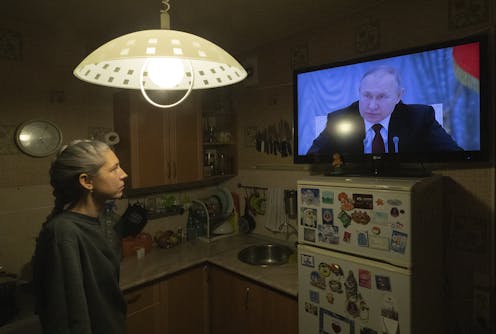
Speaking to journalist Sophie Raworth on the BBC’s Sunday Morning show recently, former war crimes prosecutor Sir Howard Morrison, now an advisor to the Ukraine government, highlighted the dangers posed by the negative – often insulting and dehumanising – statements made by some Russian politicians and media personalities about Ukraine and its people.
“Genocide is often rooted in the way that one nation or one ethnic group views another and how it describes them,” Morrison said, citing the way Nazis referred to the Poles as “subhuman” before and during the second world war, or the way Hutu elites in Rwanda referred to Tutsis as “cockroaches” before the 1994 genocide. “It’s this dehumanisation – and the pretence that they are not a real people or have a real culture.”
The many crimes documented in Ukraine committed by Russian soldiers have caused fury and hurt among Ukrainians – but hardly surprise. The conditions and attitudes described by Morrison have existed for centuries: Russians have viewed Ukrainians as inferior since before the Soviet era.
A recent report from the Atlantic Council found that Vladimir Putin’s regime had “mobilised anti-Ukrainian hysteria among Russians in the decade leading up to the Kremlin’s 2014 aggression”.
In 2012, Putin’s power was shaken by the Bolotnaya Square protests in Moscow, immediately prior to the Russian president’s inauguration for his third term which many Russian dissidents believe he won illegitimately. Then in 2014, Putin was unnerved to see pro-democracy protesters succeed during Ukraine’s “Revolution of Dignity”. Shortly thereafter, Russia annexed Crimea and began a covert campaign of armed violence in the Donbas.
Since then, Russian propaganda has portrayed Ukraine as a failed state that has descended into chaos and disorder. In Russia, the ghosts of the past are not so much the Soviet-era repressions but rather the struggles and privations of the 1990s, such as the extreme poverty and open mafia violence during Russia’s unsuccessful transition to democracy. Putin likes to paint himself as a guarantor of stability. This is the somewhat Faustian bargain Russian society has accepted, giving up their freedoms for this stability.
During Soviet times, Ukraine was considered second only to Russia in the USSR hierarchy, treated better than the central Asian republics. Russians nowadays see Ukraine as the most culturally proximate former Soviet nation, so Ukraine’s embrace of democracy and human rights puzzled many of them. They wrote it off as something that Ukrainians, who are stereotyped by Russians as “simple-minded” and “naive”, had bought into against their best interests with EU and US encouragement.
Democratic reforms introduced in Ukraine in order to deepen its engagement with the EU meant visa-free travel to Schengen states for Ukrainians, something that deeply angered many Russians who wondered how “inferior” Ukrainians could be allowed into the EU without a visa while Russians needed one.
A commentator on a Russian online forum in 2016 imagined the entire population of Ukraine abandoning their homeland to “clean toilets” in the EU:
95% of the population [of Ukraine] does not need [visa-free travel to the EU]: they do not have money for Euro-tourism, and “visa-free” does not give the right to work in Europe … No one in their right mind would provide even a half-visa regime to an impoverished country full of weapons and laws that do not work. And what types of work are and will be performed by Ukrainian migrant workers in Europe – everyone knows too … Prostitution and cleaning toilets is called “European integration”.
This comment represents Russian stereotypes of Ukraine as poor, disorderly and lacking civic patriotism – and of Ukrainians as “second-class” Europeans. Researchers have also documented various forms of hate speech denigrating Ukrainians and denying Ukrainian statehood on Russia’s most popular social network, VK.
Cognitive dissonance
When the Russian forces began the full-scale invasion of Ukraine in February 2022, most Russian soldiers expected not only to be greeted as liberators but also to find people suffering under the yoke of “Nazi usurpers”. They thought Ukraine would be like Russia of the 1990s – divided, disorganised and poor.
Ukraine’s per capita GDP was US$3,725 (£3,000) in 2020, while Russia’s was almost three times higher at US$10,127. On the other hand, as recently as 2017, Ukraine topped the list of the world’s most equal countries by the Gini index. Russia was a long way down the list.
In fact, Russian invaders found neat, prosperous villages and towns where people lived decently and as communities. Ukrainians apparently could have it all: a democracy and an economy, imperfect but functioning.
The invaders were astonished at Ukrainians’ standards of living (Russian looters were reportedly surprised at the sight of Nutella in Ukrainian houses, which they apparently saw as a sign of untold luxury).
They were also surprised by Ukraine’s community spirit: mayors, priests and volunteers braved bullets to distribute food to compatriots, rejecting and defying Russian soldiers’ threats and bribes. This stood in stark contrast with the Russian military leadership’s disregard for supplying, directing and evacuating its soldiers.
Confronted with Ukraine’s stiff resistance but also signs of a good life, Russian soldiers must have wondered how Ukrainians, considering their stereotyping in Russia as “simple” and “naive”, could have built a functioning country on their own.
The narrative of Ukraine being under the control of – variously – the west, George Soros or “Judaeo-Masons” would have resonated with the soldiers. And, as Morrison said, stereotyping and denigrating a people as inferior or lacking agency makes atrocities and looting more likely to happen, as we are seeing in Ukraine.
Kseniya Oksamytna does not work for, consult, own shares in or receive funding from any company or organisation that would benefit from this article, and has disclosed no relevant affiliations beyond their academic appointment.
This article was originally published on The Conversation. Read the original article.







